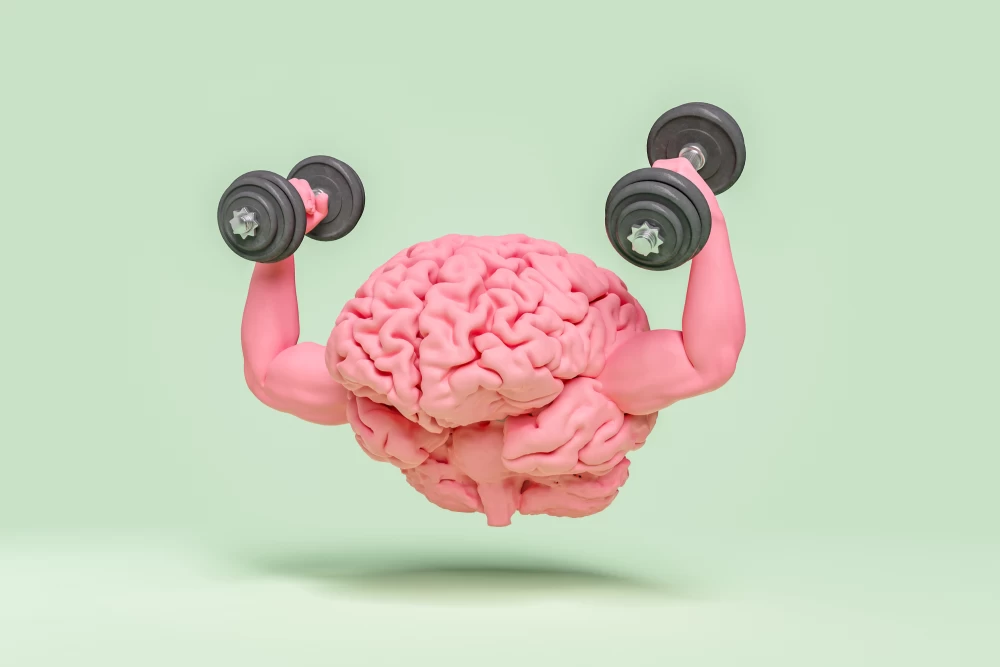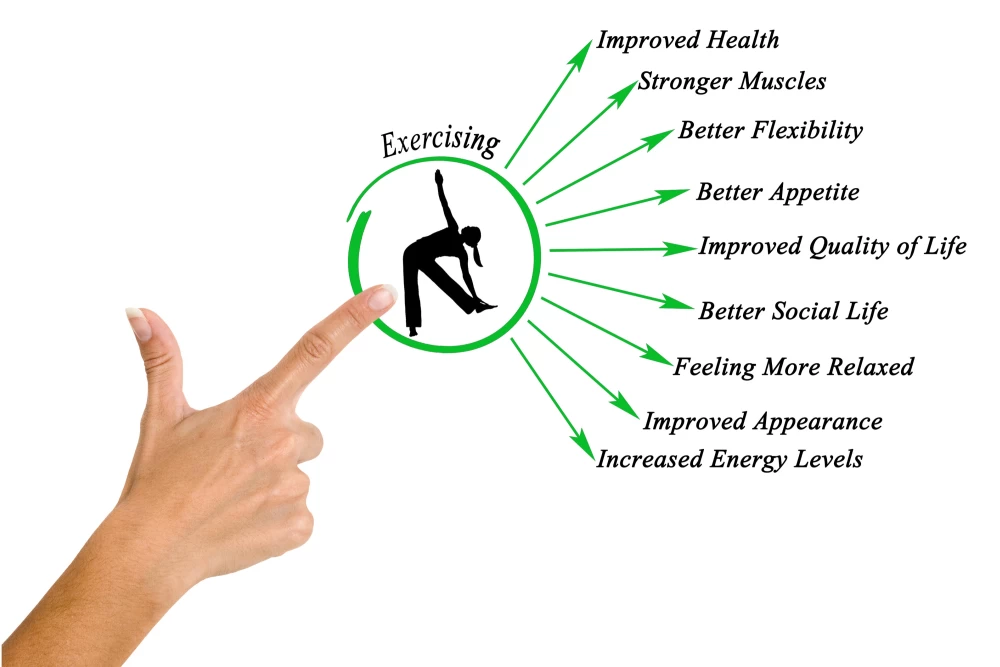
- 19th July 2023
Table of Contents
- Clarifying Why Good Mental Health Is So Crucial
- Advantages of Exercise to Your Body
- Positive effects on physical well-being
- Advantages of Exercise for Mental Health
- Effects on elation and calmness
- Working Out and How the Brain Works
- Improvements in reasoning and recall
- Various Mentally Beneficial Exercises
- Various methods to better one's mental health
Clarifying Why Good Mental Health Is So Crucial
Working out your muscles has positive effects on your mind as well as your body. Stress, anxiety, and sadness can all be mitigated by maintaining a regular exercise routine. This is because physical activity triggers the release of endorphins, which function as both painkillers and mood boosters.
Physical exercise has other benefits, including improved sleep, higher self-esteem, and greater confidence. Getting your body moving is a great way to clear your head and feel good about yourself. Working out allows you to establish and pursue attainable objectives, which can boost your confidence. In addition to helping you forget about your worries and focus on the here-and-now, it can be a welcome diversion when you're feeling down.
In conclusion, adding regular exercise into one's schedule is crucial for fostering positive mental health. Physical fitness is important, but regular exercise also has positive effects on mental health. Therefore, people should make physical activity a daily priority in order to enjoy the many long-term benefits to their mental and physical health.
Advantages of Exercise to Your Body
Physical activity has numerous positive effects on our health and happiness. In addition to assisting with weight management, strengthening bones and muscles, and increasing general fitness, regular exercise also helps lower the chance of developing chronic conditions like diabetes and heart disease.
The immune system is boosted by regular exercise, making us better able to stave off illness. The cardiovascular system also benefits from exercise since it reduces blood pressure and cholesterol levels. It can also improve cognitive abilities by raising cerebral blood flow and encouraging the development of new brain cells.
The chance of developing some cancers has also been shown to decrease with regular exercise. Overall, there are many physical benefits that may be gained through making physical activity a regular part of our everyday lives. Taking care of our bodies through exercise helps us to have more energy and vitality overall in life.
Positive effects on physical well-being
The physical and mental health advantages of exercise are well-documented. Cardiovascular fitness can be enhanced through exercise, which raises heart rate and builds heart muscle. It also aids in lowering both blood pressure and cholesterol.
The immune system of a healthy person who exercises regularly is stronger and less likely to become unwell. According to the best dietician in Delhi, Dr. Pankaj Kumar, exercising not only improves one's physical health, but also one's emotional well-being. Exercising releases endorphins, which elevate one's mood and make one feel more upbeat and optimistic. Because it lowers the body's stress levels, it can aid with depression and anxiety.
Physical activity has been shown to boost cognitive function in a number of ways, including memory, focus, and concentration. Overall, there are many positive effects of frequent exercise on one's physical health. Maintaining a healthy state of mind and body through regular exercise can lead to a more fulfilling and energised existence. If you want a better tomorrow, you need to get moving today.

Advantages of Exercise for Mental Health
While there are many obvious physical benefits to exercise, there are also significant mental health advantages. Endorphins, the body's natural mood-lifters, are released during exercise, making it a great method for combating sadness and anxiety.
Cortisol, a hormone that contributes to stress and anxiety, is reduced in part because of regular exercise. Memory and concentration are two cognitive abilities that benefit greatly from regular exercise. The neuronal network in the brain is stimulated and healthy blood flow is facilitated by engaging in physical activity. The satisfaction that comes from surpassing one's own fitness objectives is another way in which exercise boosts confidence.
It improves one's attitude on life and one's belief in one's own abilities. In conclusion, adding exercise to one's daily routine has positive effects on one's physical and mental health. Those who make improving their physical health a priority experience less stress, better mental health, more self-esteem, and more happiness in their lives.
Effects on elation and calmness
Exercising has been demonstrated to improve mood and reduce anxiety. Endorphins are substances in the brain that promote emotions of contentment and relaxation, and their release during regular physical activity can help alleviate symptoms of despair and anxiety.
In addition to lowering stress levels, regular exercise has been shown to improve heart rate variability. Exercising not only helps with mood and anxiety right away, but it can also have long-term positive effects on mental health. Regular exercisers have been proven to have a lower lifetime risk of developing mood or anxiety problems. One possible explanation for this is that regular exercise stimulates the development of new brain cells, which in turn can boost both mental and emotional health.
Regular exercise has been shown to have numerous beneficial effects on mental health. You may improve your mood and lessen your anxiety by engaging in any kind of physical activity, whether it's going for a stroll outside or working out at the gym.
Working Out and How the Brain Works
Exercising regularly has been linked to improvements in mental health. Exercising helps alleviate stress and melancholy by triggering the release of feel-good endorphins in the brain. Exercising has also been linked to higher sense of confidence and pride in oneself.
In addition, research has connected physical activity to enhanced brain function and wellness. By increasing oxygen and nutrients to the brain, it improves the ability to make rational decisions, plan ahead, and solve problems. Neuroplasticity, or the brain's capacity to form new connections, is also boosted by physical activity. Research has revealed that older persons who maintain a regular exercise routine have a lower risk of cognitive decline and dementia.
Overall, a person's mental health and cognitive abilities can benefit greatly from a more active lifestyle. Physical activity of any kind, from jogging to swimming to dance, and beyond, contributes to better mental and physical health.
Improvements in reasoning and recall
In addition to improving physical health, exercise also boosts mental capabilities. Aerobic exercise has been proven to increase neurogenesis in the hippocampus, the area of the brain responsible for learning and memory. Improved cognitive abilities, including in the areas of attention and decision making, are the direct result of this increase in brain cell count.
Additionally, exercise raises the volume of blood flowing to the brain, which carries oxygen and nutrients that the brain needs to operate at its highest level. Inflammation, which can have a detrimental effect on one's mental faculties, is reduced as well, and this includes the brain. In addition to its obvious benefits for physical health, exercise has also been shown to have a positive effect on mental health and well-being.
Overall, a person's cognitive abilities and memory can benefit greatly with a regular exercise routine. Physical and mental health benefit from regular physical activity, whether it be a brisk daily walk or an intense workout at the gym.
Various Mentally Beneficial Exercises
Several different kinds of physical activity have been shown to improve mental health. Aerobic, or cardio, training comes first. Some examples are running, cycling, swimming, and even dancing! Aerobic exercise has been shown to alleviate symptoms of depression and anxiety by increasing levels of endorphins. They also aid cognitive performance by increasing cerebral blood flow.
Second, yoga has long been recognised for its ability to alleviate tension and lift spirits. Asanas (physical postures), Pranayama (breathing methods), and meditation all contribute to a state of mental calm and bodily relaxation. Last but not least, studies have found that strength training, such weightlifting or resistance band exercises, might boost self-esteem and confidence in people with mental health conditions. Improved sleep hygiene is another mental health benefit of this form of exercise.
Various methods to better one's mental health
One of the best methods to boost emotional health is to work out. Reducing stress, anxiety, and sadness is a well-documented side effect. When you work out, your body releases endorphins, which are responsible for making you feel good.
Exercising also has the added benefit of boosting one's sense of pride and competence. Yoga, running, and hiking are just a few examples of the many forms of physical activity that can boost mental health. Yoga is a practise that incorporates physical postures and breathing exercises to calm the body and the mind. Running increases blood flow and oxygen to the brain and also releases feel-good endorphins, both of which assist clear the mind.
When you go for a walk in the great outdoors, you get to work up a sweat and then unwind in a serene setting. In conclusion, making physical activity a regular part of your life is a great approach to boost your mental health. Whether it's yoga, running, or hiking, everyone may find a sort of physical activity that improves their mood and health.














